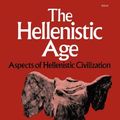
Hellenistic Age
Bury B J
Four distinguished classical scholars write here on aspects of the Hellenistic Age, from the conquest of Alexander the Great down to Rome’s completion of her eastern conquests by the annexation of Egypt. In "the Hellenistic Age and History of Civilization," J.B. Bury discusses important advances made in mathematics, astronomy, and geography; the pattern of the hellenization of Rome; and changing Greek ideas of barbarianism and cosmopolitanism. E. A. Barber’s essay, "Alexandrian Literature," deals with the characteristic styles of the period, Alexandrian poetry, and the new prose forms. Besides the scientific and learned writing it is known for, Professor Barber demonstrates, the age produced much popular satiric and moralizing poetry, realistic mime, epigrams, and parodies.As the system of the city states declined, increasing social instability fostered the rise of a number of popular philosophies. In another chapter, Edwyn Bevan outlines the similarities and differences between the Platonic, Peripatetic, Stoic, Epicurean, Sceptic, and Cynic schools and the effect of Christianity on their society.W. W. Tarn’s "The Social Question in the Third Century" examines the conditions that led to revolution in the century after Alexander. The author describes the economic disturbances leading to the polarization of classes, and assesses the phases of social revolution as exemplified in the uprisings at Sparta.
Booko found 2 book editions
Product filters
| Product |
Details
|
Price
|
New
|
Used
|
|---|---|---|---|---|
|
|
New: Being refreshed...
Used: Being refreshed...
|
New: Being refreshed...
Used: Being refreshed...
|
Being refreshed... | Being refreshed... |
|
|
New: Being refreshed...
Used: Being refreshed...
|
New: Being refreshed...
Used: Being refreshed...
|
Being refreshed... | Being refreshed... |
Booko collects this information from user contributions and sources on the internet - it is not a definitive list of editions. Search Booko for other editions of Hellenistic Age.



















![Cover Art for 9789124038052, The Daily Stoic, [Hardcover] The Daily Stoic Journal, [Hardcover] Perennial Seller By Ryan Holiday Collection 3 Books Set by Ryan Holiday](https://bn.bkocdn.info/covers/2f64d6c24eaef9da/v/167x250.jpeg)

